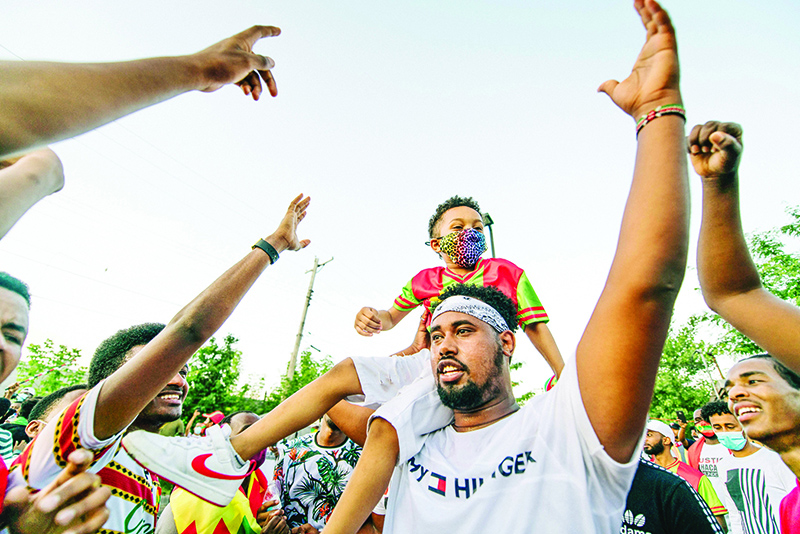
ADDIS ABABA: Five senior members of an opposition party representing Ethiopia’s largest ethnic group, the Oromo, have been detained in a wave of political arrests following protests last week which left at least 166 dead. Violent demonstrations broke out in the capital Addis Ababa and the surrounding Oromia region following the murder last Monday of popular Oromo singer Hachalu Hundessa which fuelled ethnic tensions.
The opposition politicians from the Oromo Liberation Front (OLF) were seized by security forces in Addis Ababa, party chairman Dawud Ibsa told AFP. Those arrested include senior political officers Chaltu Takkele and Gemmechu Ayana, as well as Kennesa Ayana, a member of the party’s central committee. “We don’t know why they were taken,” Dawud said. “They were just simply sitting in their rooms and doing their jobs.”
The political crackdown deepens fears of a large-scale roundup of government critics as Prime Minister Abiy Ahmed seeks to maintain control and keep a lid on simmering ethnic tensions and resentments. Hachalu’s songs channeled marginalization among his Oromo ethnic group, and were the soundtrack to anti-government protests that swept Abiy, the country’s first Oromo leader, to office in 2018.
News that he was shot dead led to an outpouring of anger among the Oromo and officials have said the deaths that followed were a result of lethal force by security officers and inter-ethnic violence. An Oromia police official said late Saturday that 156 people had been killed across the region in the ensuing violence, including 11 members of the security forces. Ten additional deaths have been reported in Addis Ababa. The situation in the capital has been calm since Friday, though a nationwide internet blackout remained in effect Monday for a seventh consecutive day.
New leader, old tactics
Abiy, who won last year’s Nobel Peace Prize in part for opening up Ethiopia’s political space, lifted a ban on the OLF shortly after he assumed office in 2018. But the OLF’s Dawud said some senior members of his party had been arrested numerous times since then and held for extended periods-several months in some cases-without ever seeing a courtroom, a tactic common under previous Ethiopian leaders. “It’s the continuation of the past and we don’t know why it’s happening,” he said. The OLF is not the only party to be targeted in recent days. During last week’s unrest, officials also detained Jawar Mohammed and Bekele Gerba from the Oromo Federalist Congress, as well as Eskinder Nega, a longtime government critic who has recently spoken out against government policies he argues favor Oromos. All three men appeared briefly in court last week.
On Friday officials also detained Yilkal Getnet, chairman of the opposition Ethiopian National Movement Party, for reasons that remain unclear, according to Girma Bekele, vice chairman of the Ethiopian Political Parties Joint Council, a consortium of more than 100 parties. “I for one do not think Yilkal has any involvement with recent unrest. He believes in a peaceful, legal struggle,” Girma told AFP.
Gunshots, beatings, burns
Officials have not provided a detailed breakdown of the cause of the protest deaths, but a doctor at the referral hospital in the town of Adama, about 100 kilometers southeast of Addis, told AFP that 18 deaths and more than 90 injuries had been confirmed at the facility. “A lot of them were bullet injuries,” the doctor said, noting that in many cases victims reported having been shot by security forces. The doctor, who spoke to AFP on condition of anonymity, also said 24 patients were “burn cases” who said that civilians threw scalding chemicals on them during inter-ethnic violence. Still other victims were stabbed with knives or bludgeoned with sticks, the doctor said. Tensions among Ethiopia’s many ethnic groups have repeatedly spilled over into violence under Abiy, forcing millions to flee their homes.
The current tensions and violence comes as Ethiopia is preparing for landmark elections that were scheduled for August but have been delayed because of the coronavirus pandemic.- AFP
.jpg)
